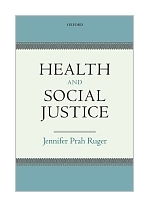Health and Social Justice
Includes Foreword by Nobel Laureate Amartya Sen
Contains applications to policy issues and resource
allocation decisions at both the macro and micro levels
Clear lay-out and in-depth introduction of the various
components of the health capability paradigm
Challenges the current scope of public opinion research
Argues that shared values are needed to achieve social
agreement for political and legal decision-making and has pragmatic advantages in forging
consensus and coalitions
Health and Social Justice provides a theoretical framework for health ethics, public
policy and law in which Dr Ruger introduces the health capability paradigm, an innovative
and unique approach which considers the capability of health as a moral imperative. This
book is the culmination of more than a decade and a half of work to develop the health
capability paradigm, with a vision of a world where all have the capability to be healthy.
This vision is grounded in the Aristotelian view of human flourishing and also Amartya
Sen's capability approach. In this new paradigm, not just health care, or even just health
alone, but the capability for health itself is a moral imperative, as is ensuring the
conditions that allow all individuals the means to achieve central health capabilities.
Key tenets of health capability include health agency, shared health governance, where
individuals, providers and institutions work together to create a social system enabling
all to be healthy, and the use of theorized agreements and shared reasoning to guide
social choice and shape health policy and decision-making. This book provides
philosophical justification for the direct moral importance of health and the capability
for health and follows a norms-based approach to health promotion. It employs a joint
scientific and deliberative approach to guide health system development and reform, and
the allocation of scarce health resources. The health capability paradigm integrates both
proceduralist and consequentialist approaches to justice, and both moral and political
legitimacy are critical.
Readership: Academics and students specialising in health economics; Policy makers
working on health related matters; and other academics working in areas of public health
and welfare economics.
Table of Contents
Introduction
The Current Set of Ethical Frameworks
1: Approaches to Medical and Public Ethics
An Alternative Account- The Health Capability Paradigm
2: Health and Human Flourishing
3: Pluralism, Incompletely Theorized Agreements, and Public Policy
4: Justice, Capability, and Health Policy
5: Grounding the Right to Health
Domestic Health Policy Applications
6: A Health Capability Account of Equal Access
7: A Health Capability Account of Equitable and Efficient Health Financing and Insurance
8: Allocating Resources: A Joint Scientific and Deliberative Approach
Domestic Health Reform
9: Political and Moral Legitimacy: A Normative Theory of Health Policy Decision-making
Conclusion
320 pages, Paperback
Księgarnia nie działa. Nie odpowiadamy na pytania i nie realizujemy zamówien. Do odwolania !.


